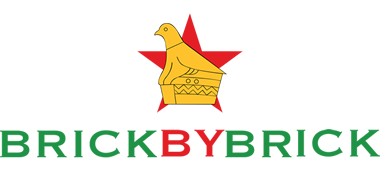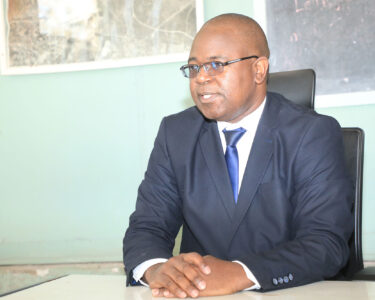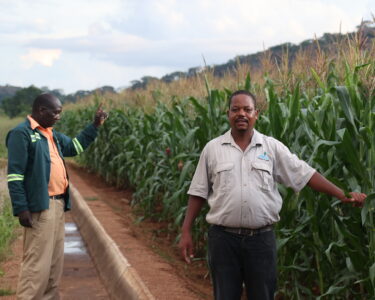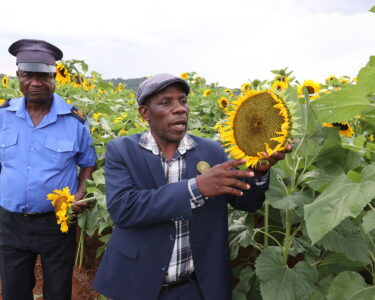When the perennial naysayers hear about the government’s climate-proofed Pfumvudza/Intwasa programme, they are wont to dismiss it as some ill-conceived initiative. However, Brick by Brick reporter Elias Chakanyuka was pleasantly surprised when he talked to some of the beneficiaries of the Presidential Cotton Inputs Scheme in Gokwe South recently. He discovered that the innovative programme has significantly transformed the lives of women, not to mention youth. One such beneficiary is Shinga Mauta, who had never seen the inside of a banking hall until she was paid handsomely for her sweat . . .
President Mnangagwa introduced the Presidential Inputs Scheme in 2020 to assist farmers who were facing challenges in accessing farming inputs. Farmers who benefited from the scheme were advised to use Pfumvudza/Intwasa to ensure the efficient use of resources.
Pfumvudza/Intwasa involves the utilisation of small pieces of land and applying the correct agronomic practices in an endeavour to achieve higher returns. Its basic principles include minimum soil disturbance (holing out), using mulch to conserve moisture, timeliness of operations and adoption of good farming practices.
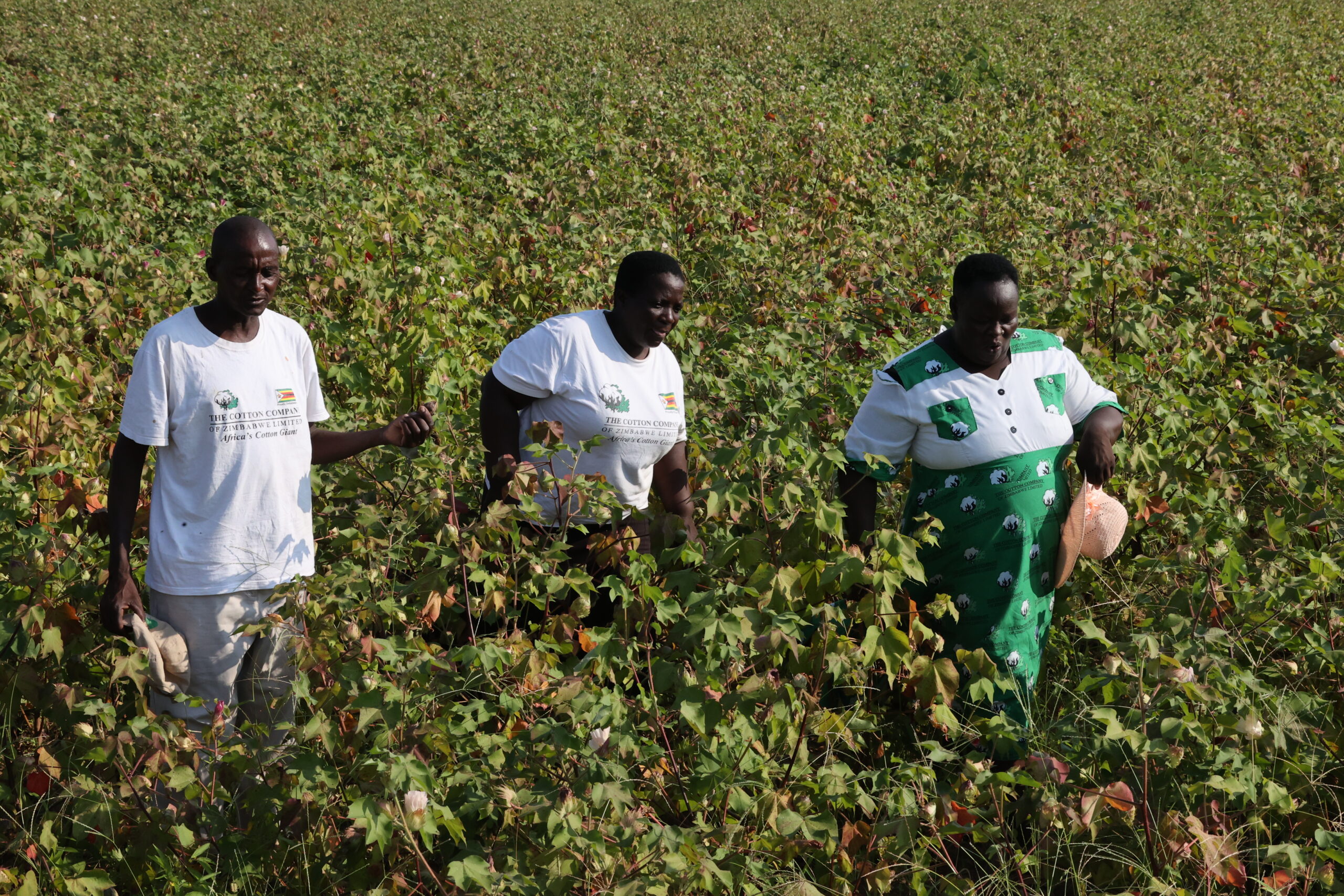
The government adopted Pfumvudza/Intwasa to address the problem of low production and productivity which was impacting negatively on the country’s food security.
The Presidential Cotton Inputs Scheme is administered by the Cotton Company of Zimbabwe (Cottco) which ensures that farmers receive their inputs on time in addition to monitoring their efficient use.
Thanks to the success of Pfumvudza/Intwasa, agriculture experts are expecting a 20% increase in cotton yields in Gokwe this season.
One of the beneficiaries of the Presidential Cotton Inputs Scheme is Shinga Mauta, who attributes her new-found wealth to the “white gold”.
“Before joining the Presidential Cotton Inputs Scheme, I had never been anywhere near a bank. Now, I have a bank account in my own name. The icing on the cake is that I no longer need any hand holding when using an ATM [Automated teller Machine]. After getting our inputs under the scheme, we used Pfumvudza to plant our cotton and, as you can see for yourself, the crop is looking extremely good. I know I will be smiling all the way to the bank again this year,” said Mauta, as she took Brick by Brick on a tour of her 5,1 hectare plot.
Mauta is the chairperson of a group of 30 women growing cotton, in addition to tobacco, in Gokwe South.
She continues her rags-to-riches story: “I joined this Cottco programme, which is specifically meant for women, with the encouragement of Mai Miriam Nyenya. Because she hates to see women engaging in idle gossip, she has come up with what she calls ‘Operation Munhu Wese Kumunda’. The women are mostly into cotton, while the men have their own pieces of land on they grow any crop of their own choice, and not necessarily cotton.
“Our lives have changed for the better since joining this scheme. We have since formed a savings club through which we take turns to buy each other household furniture. Last year we managed to buy wardrobes for each of our members. This year we are saving to buy beds.
“My husband fully supports me in my venture since I am now in a position to help him in the upkeep of the family. When he is not busy on his own plot, he lends me a helping hand on mine. Even though I am now the proud owner of my own cotton plot, I am, first and foremost, a housewife. I have the utmost respect for my husband and, when I am mot working on my cotton plot, I perform all the duties expected of a wife.
“I encourage other women to join this scheme. The Presidential Cotton Input Scheme and Pfumvudza have really transformed our lives. Ngatiregei kugarira maoko madzimai.
“I want to thank Cottco for this empowerment programme. It has gone a long way in uplifting our lives. Most importantly, I want to thank President Mnangagwa for all the support he is giving us. I never thought women would be accorded such a life-changing opportunity. Indeed, the President is leaving no one and no place behind in terms of development.”
Mauta is married to Lucky Lunga, who is also into cotton farming. Like his wife, Lunga attributed the family’s changing fortunes to Gokwe’s “white gold”. “I started cotton farming in 1996 and over the years cotton has really helped my family. I have been able to educate all my children, in addition to buying a car and a grinding mill from cotton proceeds,” says Lunga.
Last year the couple produced 23 bales of tobacco, over and above their cotton crop
“My cotton field is about 3 hectares. It’s actually smaller than my wife’s, but I have no complaints. I urge all men to treat their wives with love and respect,” said Lunga, adding: “Chinonzi baba mukadzi, moreso when she is empowered. I am so happy that my wife is now empowered. It makes our life as a couple much easier, as we now share family expenses. My wife is the family treasurer. When we sell our cotton and tobacco, she is the one who does the budgeting. If I want [pocket] money, all I have to do is ask for it. It’s like withdrawing money from the bank. I do that because my wife is very good when it comes to money matters.
“Although she is the head of the treasury, she knows that Baba vanoda supper yavo.’
After hearing so much about Miriam Nyenya, Gokwe South’s “Cotton Lady” or more accurately “Iron Lady”, Brick by Brick tracked her down for a chat.
“Ini ndiri soja raPresident Mnangagwa,”she declares boldly. “As the coordinator of Cotto programme targeting women, I have been criss-crossing the country urging women to venture into cotton farming.”
Continues the Gokwe-born “Iron Lady”, who is also a successful cotton farmer in her own right: “My target is to have a minimum of 300 women engaged in cotton farming in each ward. The Cottco programme is meant to empower women. We don’t want women to be dependent on their husbands. We want women who are in a position to help their spouses not those who are a burden to them.
“So far, I have been to Chiredzi, Mt Darwin, Mhondoro, Nemangwe, Muzarabani, Bindura and Domboshava encouraging women to grow cotton. The response has been overwhelming.”
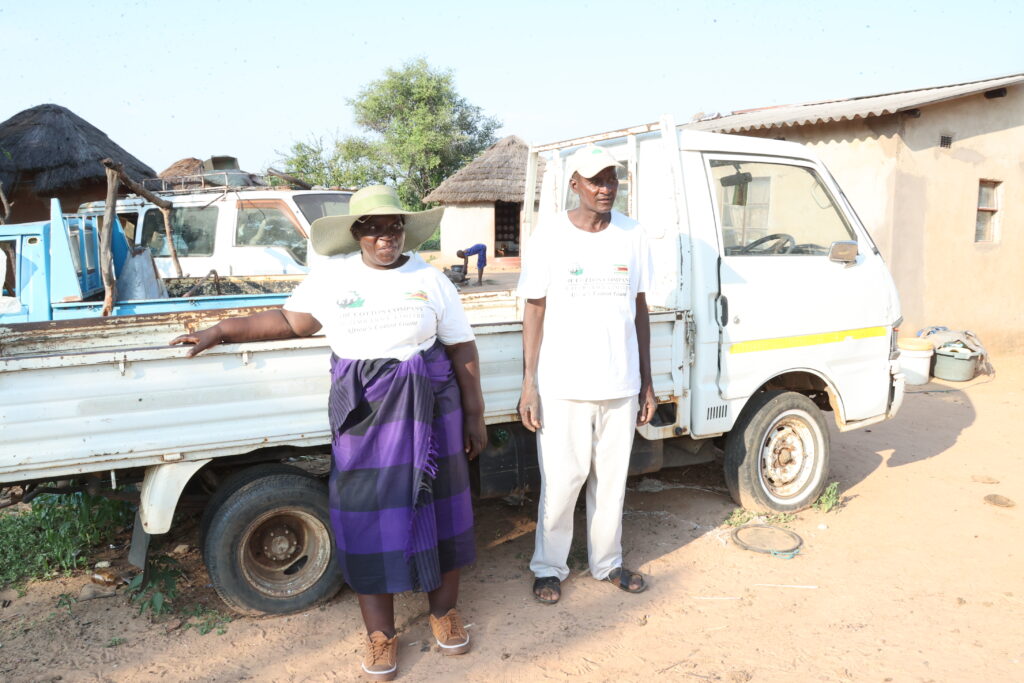
Nyenya, however, refuses to take credit for the overwhelming success of the Cottco initiative, saying: “The President is fully behind this cotton programme. These fields were tilled by tractors under the Presidential Scheme. The women also get sprays and chemicals for free under the Presidential Cotton Inputs Scheme. The President has shown us beyond doubt that he wants to empower women and I will do all I can to make sure that women across the country benefit from this programme.
“I want to thank President Mnangagwa for facilitating the opening selling points here in Gokwe so that our women don’t have to travel long distances. I have lectured these women on the need to consult their husbands on how to spend the money. They may be the new breadwinners, but they still have to respect their husbands. Tinotenda Shumba Murambwi. Ngavarambe vakadaro,” said the self-proclaimed presidential foot soldier.
Chrispen Gwauya is Cottco’s business manager at the Gokwe Business Unit and expects the cotton production figures to go up this season.
Says Gwauya: “Many farmers in Gokwe are venturing into cotton production in response to the Presidential Cotton Inputs Scheme. Not less than 63 000 cotton farmers have benefited under the scheme and have between them put about 49 000 hectares under the crop, which thrives in low-rainfall areas.
“My forecast for this year is 21 000 tonnes of seed cotton, up from the 16 000 tonnes delivered last year. This is a great improvement which I attribute to the Presidential Cotton Inputs Scheme.
“Thanks to cotton, our local farmers are creating employment for themselves. Increasing disposable incomes in Gokwe will see the revival of some defunct industries. For example, we now have entrepreneurs travelling all the way from Harare to sell their wares here.”
But Gwauya is not resting on his laurels: “We need to go a gear up by assisting cotton farmers in the marketing their crop. In addition, we would like to see farmers adding value to their cotton.”
Cottco’s senior area manager at the Gokwe Business Unit, Josiah Bhaureni, was equally upbeat when Brick by Brick solicited his views.
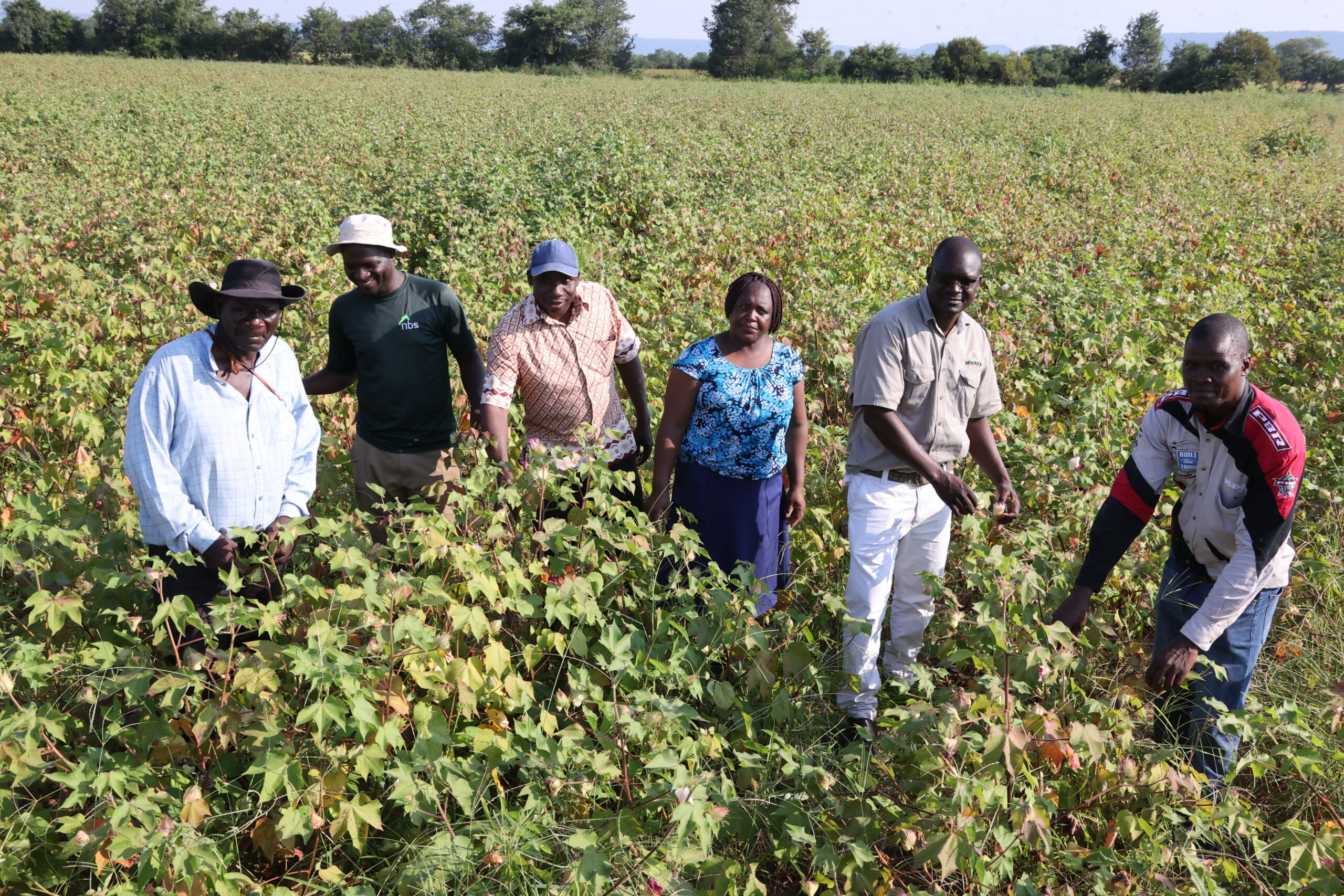
“As Cottco, we are implementing the Presidential Inputs Scheme targeting cotton. We were assigned by the government to encourage farmers to grow cotton. We distribute the inputs on behalf of the President. So far so good. I want to say we are quite happy with the state of the cotton crop in Gokwe South.
“More gratifying still is the fact that this year we had more farmers venturing into cotton farming than last year. Even the hectarage has gone up. More and more farmers are opting for cotton in response to our attractive payment modalities. For example, last season, farmers got 75% of their money in US dollars. They were also paid timeously, thereby motivating others to join the scheme,” said Bhaureni.
The tributes continue to pour in with the acting district administrator for Gokwe District, Tawanda Chakata, summing up Gokwe’s cotton success story as follows: “We thank President Mnangagwa for providing inputs to the cotton farmers here. The Presidential Cotton Inputs Scheme has changed the face of Gokwe. The programme has empowered both women and our youths. I also want to thank the President for capacitating us by buying us motorcycles and phones. This has made our job much easier. This way we gain access to more farmers, helping us to monitor what is happening on the ground.”
Judging by the overwhelming response of Gokwe farmers to the Presidential Cotton Inputs Scheme, the Minister of Provincial Affairs and Devolution in the Midlands Province, Larry Mavima, has every reason to dream big.
He was recently quoted as saying: “Gokwe will be turned into a third largest city in Zimbabwe owing to its cotton growing potential. Gokwe accounts for the bulk of cotton grown in the country. So you can see the potential it has, with 52% of the cotton grown in the country coming from the area. We need to put our heads together and turn Gokwe into a textile and clothing hub, transforming it into the third largest city in Zimbabwe, following after Harare and Bulawayo.”
A bridge too far, perhaps? But then cotton is not known as the “white gold” for nothing. The best, as they say, is yet to come! Gokwe is definitely poised for greater things.

